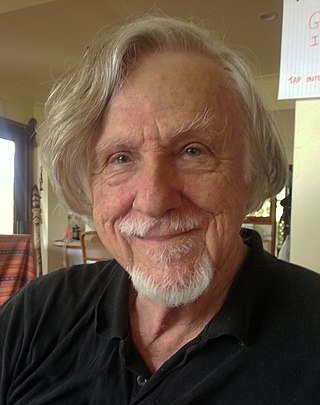Related Research Articles

William Norman McLaren, LL. D. was a Scottish Canadian animator, director and producer known for his work for the National Film Board of Canada (NFB). He was a pioneer in a number of areas of animation and filmmaking, including hand-drawn animation, drawn-on-film animation, visual music, abstract film, pixilation and graphical sound. McLaren was also an artist and printmaker, and explored his interest in dance in his films.
Roman Kroitor was a Canadian filmmaker who was known as a pioneer of Cinéma vérité, as the co-founder of IMAX, and as the creator of the Sandde hand-drawn stereoscopic 3D animation system. He was also the original inspiration for The Force. His prodigious output garnered numerous awards, including two BAFTA Awards, three Cannes Film Festival awards, and two Oscar nominations.
George Garnett Dunning was a Canadian filmmaker and animator. He is best known for producing and directing the 1968 film Yellow Submarine.

Michael Dattilo Rubbo is an Australian documentarian/filmmaker.
Don Owen was a Canadian film director, writer and producer who spent most of his career with the National Film Board of Canada (NFB). His films Nobody Waved Good-bye and The Ernie Game are regarded as two of the most significant English Canadian films of the 1960s.
John Feeney was a New Zealand-born director, photographer and writer.
Colin Archibald Low was a Canadian animation and documentary filmmaker with the National Film Board of Canada (NFB). He was known as a pioneer, one of Canada's most important filmmakers, and was regularly referred to as "the gentleman genius". His numerous honors include five BAFTA awards, eight Cannes Film Festival awards, and six Academy Award nominations.
City of Gold is a 1957 Canadian documentary film by Colin Low and Wolf Koenig, chronicling Dawson City during the Klondike Gold Rush. It made innovative use of archival photos and camera movements to animate still images, while also combining narration and music to bring drama to the whole. Its innovative use of still photography in this manner has been cited by Ken Burns as the source of inspiration for his so-called Ken Burns effect, a type of panning and zooming effect used in video production to animate still images.

Grant Munro LL. D. was a Canadian animator, filmmaker and actor. In 1952, he co-starred with Jean-Paul Ladouceur in Norman McLaren's Neighbours. His film, Christmas Cracker, was nominated for an Academy Award in 1965.
Eskimo Artist: Kenojuak is a 1964 Canadian short film about Inuk artist Kenojuak Ashevak, directed by John Feeney and produced by the National Film Board of Canada (NFB). It won the BAFTA Award for Best Short Film in 1964 and, in 1965, was nominated for the Academy Award for Best Documentary Short Film.
Joseph Bernard Devlin was a French-Canadian film director, producer, and writer who played an important role in the development of French-language film production at the National Film Board of Canada (NFB).
Evelyn Lambart was a Canadian animator and film director with the National Film Board of Canada, known for her independent work, and for her collaborations with Norman McLaren.

Thomas Cullen Daly was a Canadian film producer, film editor and film director, who was the head of Studio B at the National Film Board of Canada (NFB).

Joseph (Joe) Koenig is a Canadian filmmaker and entrepreneur who was the founder and president of Electronics Workbench.

Albert Kish was a Canadian documentarian/filmmaker.
Robert Verrall is a Canadian animator, director and film producer who worked for the National Film Board of Canada (NFB) from 1945 to 1987. Over the course of his career, his films garnered a BAFTA Award, prizes at the Cannes Film Festival and Venice Film Festival, and six Academy Award nominations.
Julian Biggs (1920–1972) was a director and producer with the National Film Board of Canada and its first Director of English Production. Over the course of his 20-year career, he created 146 films, two of which were nominated for Academy Awards. His film 23 Skidoo (1964) received two BAFTA nominations, including the BAFTA United Nations award.
David Bairstow (1921-1985) was a Canadian producer and director and one of the most prolific filmmakers at the National Film Board of Canada.
Los Canadienses is a 1976 documentary about the Canadian volunteers who fought in the Spanish Civil War. It was directed by Albert Kish and produced by Tom Daly and Colin Low for the National Film Board of Canada. It won several awards, including the 1977 BAFTA Award for Best Documentary.
Guy L. Coté PhD (1925–1994) was a Canadian filmmaker with the National Film Board of Canada. He was also founding president of the Canadian Federation of Film Societies, and co-founder of the Cinémathèque québécoise and the Montreal World Film Festival.
References
- ↑ "The Living Stone". onf-nfb.gc.ca. National Film Board of Canada. Retrieved January 22, 2023.
- ↑ "The Living Stone". nfb.ca. National Film Board of Canada. Retrieved January 23, 2023.
- ↑ "NY Times: The Living Stone". Movies & TV Dept. The New York Times . Baseline & All Movie Guide. Archived from the original on October 15, 2012. Retrieved November 26, 2008.
- ↑ "Inuit films move online and into northern communities". CBC News . November 2, 2011. Retrieved November 5, 2011.
- ↑ "IFFMH Chronicle, 1959". iffmh.de. International Filmfestival of Mannheim-Heidelberg. Retrieved March 8, 2023.
- ↑ "The Living Stone". onf-nfb.gc.ca. National Film Board of Canada. Retrieved January 22, 2023.